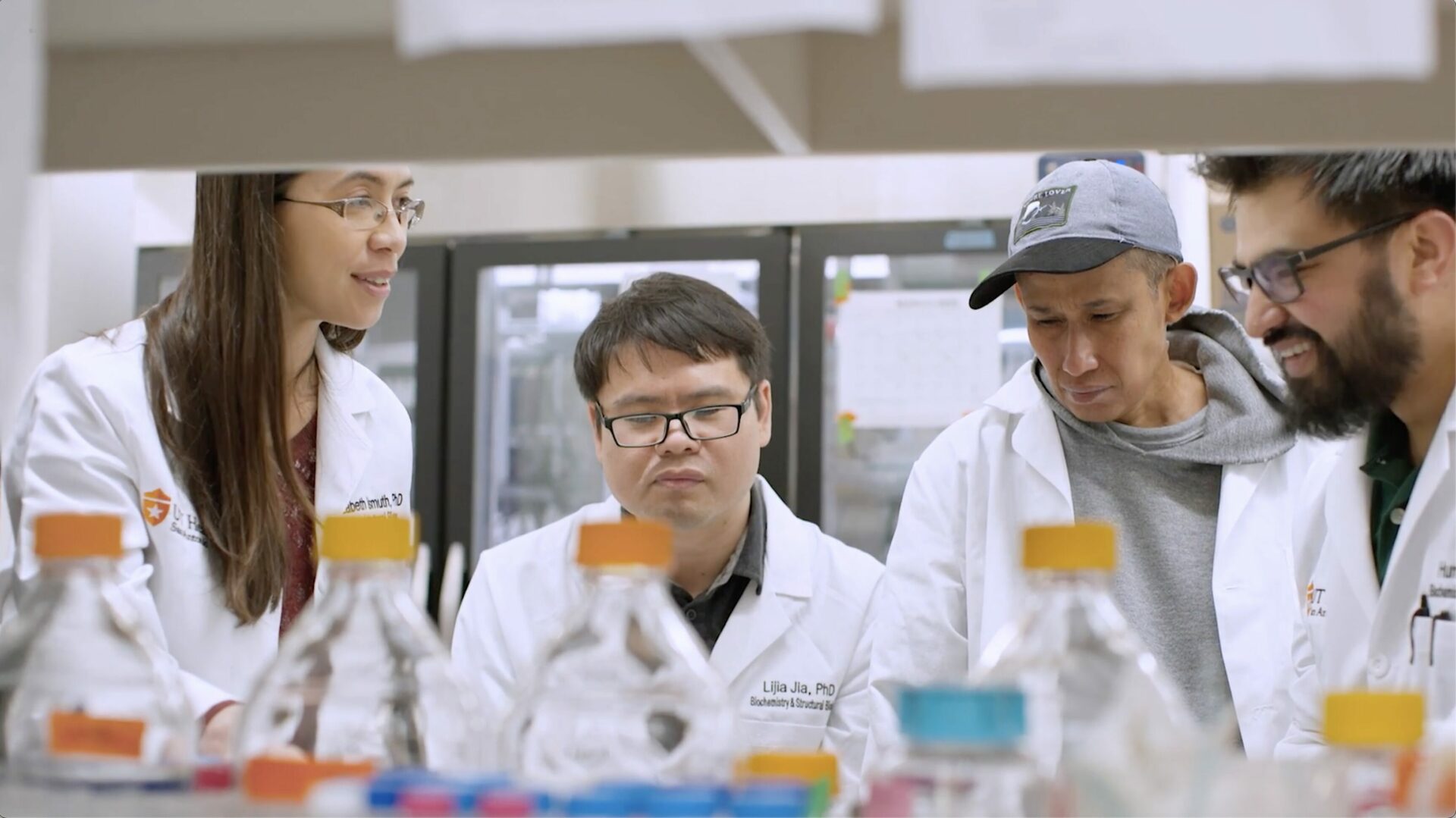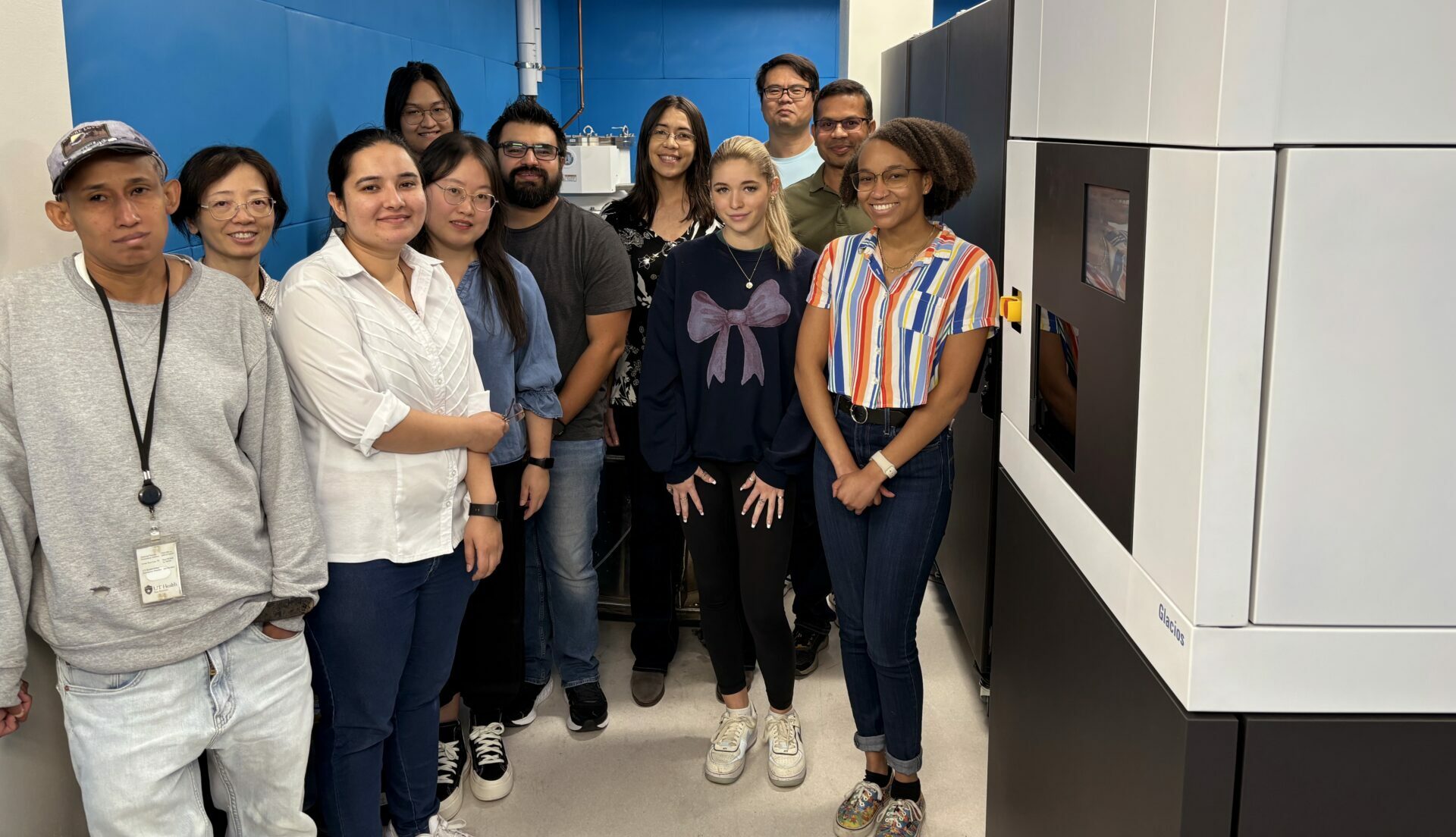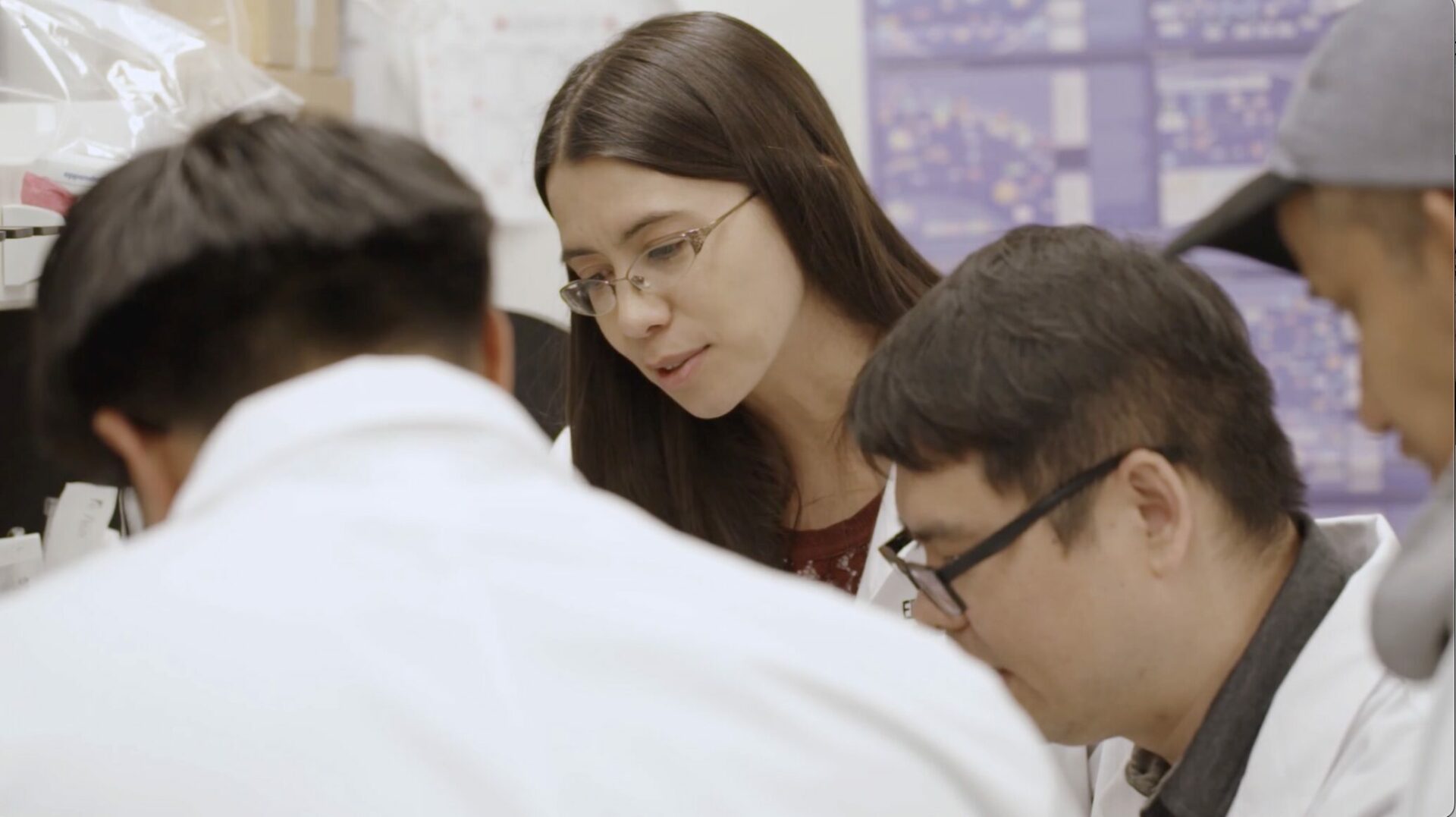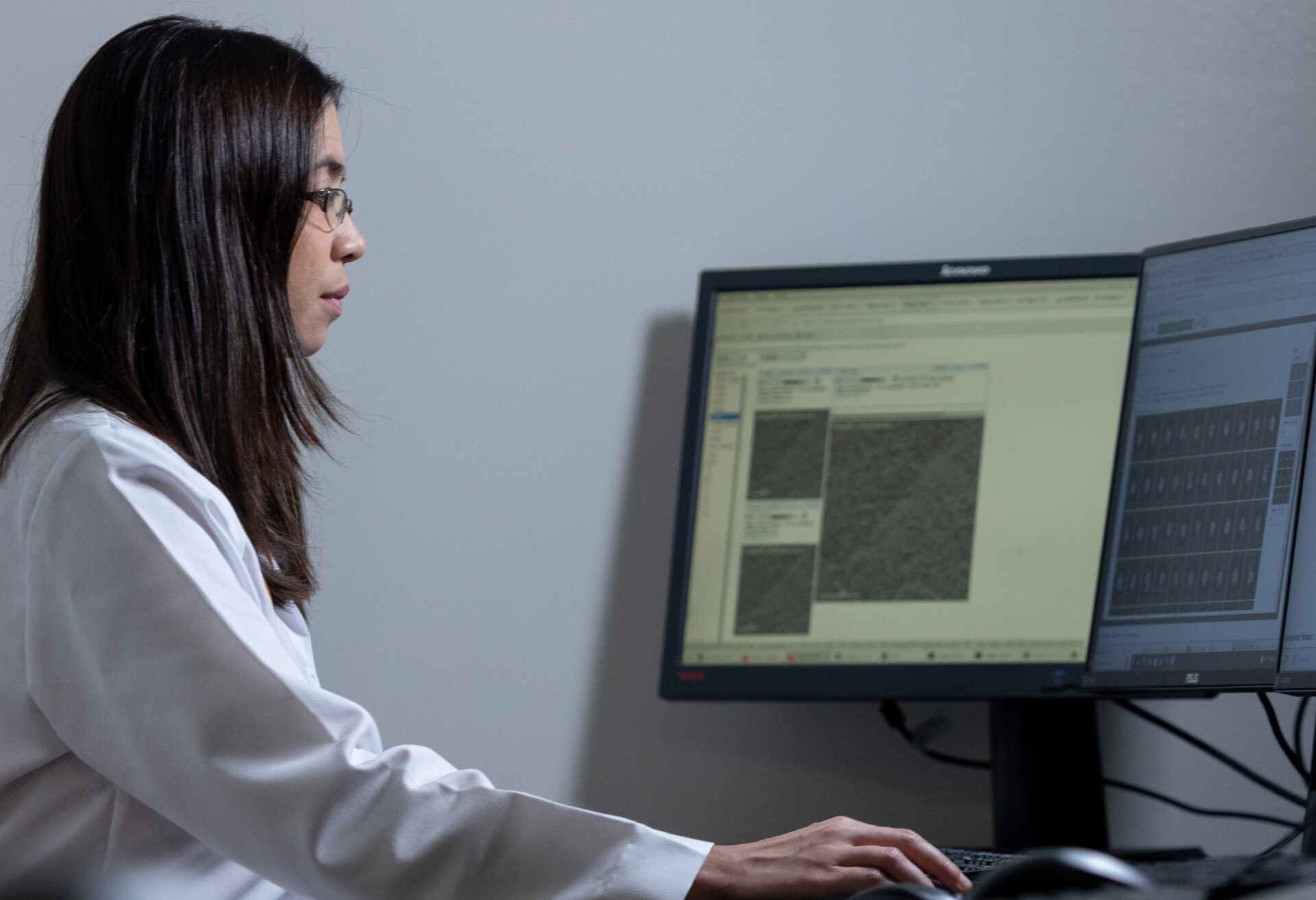Bringing Bold, Innovative Research to New Places
How Dr. Elizabeth Wasmuth’s Grant from the V Foundation is Changing the Game
As the saying goes, ‘high risk, high reward’ favors the bold. And the V Foundation is investing in bold, innovative cancer researchers who are persistently pushing us toward Victory Over Cancer®.
One of these cutting-edge cancer researchers is Elizabeth Wasmuth, Ph.D., an assistant professor at the University of Texas Health at San Antonio and a 2024 V Scholar. Dr. Wasmuth pushed the envelope, bringing new technology to the San Antonio area.
Dr. Wasmuth’s research focuses on hormone receptors, specifically steroid receptors, androgen receptors and estrogen receptors, and how they play a role in prostate, breast, uterine and ovarian cancers.
“Our focus in the lab is to understand how form follows function,” Dr. Wasmuth said. “Specifically, we use multimodal imaging techniques where we can observe how these receptors look at the level of individual atoms. To do that, we use a cooler, newer technique that relies on very high-powered microscopes that capture these steroid receptors in action.”

Dr. Wasmuth and her team have already made crucial discoveries in the early phases of their research. The dynamic shapes of the receptors allow cancer cells to evade even the best therapies currently available. With the support of the V Foundation, Dr. Wasmuth is diving deeper to see how these shapeshifting properties allow hormone receptors to cause cancer, and how to trap them with new therapies.
This research is laying the groundwork for potential new developments to take to the patient bedside.
“The next step of this foundational research is really to connect with clinicians. During my postdoctoral training, I learned that it’s critical to have a constant dialogue with the physicians who are actually treating the patients. How can we outsmart cancer? The only way is to really pull all of the best minds that are working on this complex disease and tackle it together.”
A Family Connection
Unfortunately, like many, Dr. Wasmuth’s passion for cancer research comes from a long line of cancers in her family history, including breast cancer and prostate cancer, her current research focuses.
“The most sobering moment for me was when I was entering college and my aunt battled pancreatic cancer. As we know, pancreatic cancer is a really devastating disease. She was treated at Memorial Sloan Kettering, and that was the first time I entered the hospital and saw the incredible research community there. Despite receiving the best care possible, the experience was very traumatic for all of my family members, and I just thought no one should die this way.”
As she was entering her academic career, that experience led Dr. Wasmuth to ask many questions. What is going on at the molecular level? Why is a tiny, invisible enemy taking down so many people?
“I’m drawn by how form follows function,” Dr. Wasmuth said. “In the molecular world, I saw that was an underrepresented niche in how cancer was studied. I felt that that was how I could make a bigger impact. So that was why I decided to study structural biology for my Ph.D. Then, during my postdoctoral studies, I coupled structural biology with cancer biology.”
A Rewarding Risk
After completing her postdoctoral studies at Memorial Sloan Kettering in New York City, the same hospital where her aunt was treated years prior, Dr. Wasmuth moved her work and her lab to the University of Texas Health Science Center at San Antonio. South Texas is designated as a National Institutes of Health “geographically underserved” region of the country. There are high levels of poverty as well as disproportionately high cases of cancer and other diseases, including diabetes and cardiovascular disease in its diverse populations.
Amongst her peers, the move was considered quite risky. But, coming from a similar background herself, Dr. Wasmuth was passionate about bringing services and research to this region. Her hope is that bringing research to the South Texas area could inspire cancer researchers of the future.


The V Foundation’s Scientific Advisory Committee is made up of leading oncologists and researchers from around the country. They evaluate and rate the proposals that are submitted for funding. Each year, the researcher whose project receives the highest rating is designated as The Abeloff V Scholar. This award is in honor of the late Martin D. Abeloff, M.D., a beloved member of the Scientific Advisory Committee. In 2024, Dr. Wasmuth earned the distinction, an exciting recognition for the work she is doing.
“To have been named the Abeloff V Scholar this year, honestly felt like a dream. I am so honored to have been given that recognition among all of my esteemed colleagues from very prestigious institutions. I consider this not just a victory for myself, but for the University of Texas Health Science Center at San Antonio. I decided to come here because I originally am from a minoritized background, and I grew up in a geographically and economically disadvantaged part of the country. The research enterprise is underrepresented here, and I made a conscientious decision to move to this community and build the first cryo-electron microscopy facility in South Texas.”
“It was very emotional for me and I’m very honored and will do my best to make the V Foundation and all of the patients proud of that decision.”
The V Foundation’s Impact
Dr. Wasmuth’s groundbreaking research is funded by the Stuart Scott Memorial Cancer Research Fund. Stuart Scott was a revered sports icon and an ardent advocate for cancer research, focusing on improving outcomes for minority populations disproportionately affected by the disease.
Specifically, these grants funded through the Stuart Scott Fund are directed to research focused on racial disparities in cancer outcomes as well as cancer research led by scientists from underrepresented groups. For Dr. Wasmuth and many others, this fund through the V Foundation is a one-of-a-kind investment that is changing the game within the cancer research landscape.
“The Stuart Scott fund is unique in the field of cancer research and very special because it is dedicated to understanding the underlying causes of cancer in underrepresented minority populations,” Dr. Wasmuth said. “The United States population now understands that there are pervasive health disparities in our country, and that [it’s] extremely important to treat and pay attention to minoritized groups. With my background seeing individual patients and people in my community afraid to get treatment because of distrust of the system, or the inability to afford or access health care is very, very troubling.”
“I am very honored to be named a Stuart Scott fellow and to continue this line of important research for groups that need it. The most foundational research is critically important and fills in areas that national grants tend to shy away of because they’re considered to be very high risk.”

Because of the investment from the V Foundation, Dr. Wasmuth is one of many champions relentlessly working on new discoveries. It takes a team to fund cancer research: donors, sponsors, researchers, thrivers; and a team of researchers to accelerate Victory Over Cancer®.
“Victory Over Cancer® to me looks like a diverse group of people coming together: patients, physicians, and basic research scientists, including cell, molecular and structural biologists. We all have an understanding of the enemy: cancer. We’re coordinated in our battle and how the plan of attack is going to be. We have a complete orchestra of scientists and physicians working together to fully understand the disease, crack the code, and to give patients the best care possible so that no one has to die from cancer anymore.”




